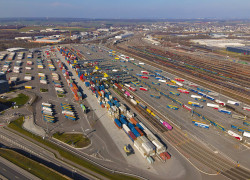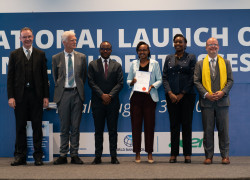PwC Luxembourg: The Luxembourg securitisation market continues to grow steadily
Professionals are more confident about the future of the Luxembourg securitisation market than last year
The financial crisis has had an impact on the European securitisation market. In Luxembourg, the business has increased steadily since 2004. The country’s regulatory advantages have encouraged this constant growth
Holger von Keutz, partner and Securitisation Leader, PwC Luxembourg
On April 24, PwC Luxembourg held its annual “Securitisation breakfast” which brought together more than 80 market players, including corporate service providers, lawyers and other market participants. Through a series of interconnected presentations and discussions, conference speakers looked at the securitisation vehicles in the wake of the implementation of the Alternative Investment Fund Managers Directive (AIFMD), provided tax and VAT update, examined the implications of the European Market Infrastructure Regulation (EMIR) and stressed the importance of internal controls.
Market sentiment is still optimistic in Luxembourg
With more than 750 active securitisation vehicles by the end of March 2013, 32 of which were regulated by the CSSF, Luxembourg remains one of the most competitive jurisdictions in Europe to structure and locate securitisation transactions. And the minimum flat corporate income tax, introduced in January 2013, and VAT exemption are likely to boost the market.
“The financial crisis has had an impact on the European securitisation market. In Luxembourg, the business has increased steadily since 2004. The country’s regulatory advantages have encouraged this constant growth,” said Holger von Keutz, partner and Securitisation Leader, PwC Luxembourg.
Currently the main asset classes include auto loans, structures investment products for retail clients, non-performing loans, consumer loans, real estate loans and private equity structures. Residential and commercial mortgages as well as auto loans and auto leasing receivables are expected to grow exponentially in the future according to participants.
AIFMD and securitisation: implications and exemptions
Market players are increasingly concerned by the implications of the AIFMD on securitisation. Based on the wide definition of an Alternative Investment Fund (AIF), some securitisation vehicles could fall within the Directive scope. This threat applies to securitisation vehicles in all European jurisdictions, and those subject to the Luxembourg Securitisation Act 2004.
This law has a very broad definition of securitisation, which allows for almost any asset producing a regular flow of income or any risk to be securitised.
Yet, securitisation special purpose entities (e.g. securitisation of loans, leasing receivables, trading receivables, funds, commodities and bond/loan portfolio) should be excluded from the scope of application of AIFMD.
Xavier Balthazar, partner, PwC Luxembourg, commented: “This exemption, which uses a definition from a European Central Bank regulation on statistical reporting, is not broad enough to cover the entire securitisation business. So there will definitely be certain vehicles to be qualified as AIFM in Luxembourg. For now, it is still difficult to say how many will fall within the AIFMD scope. We’re waiting for further guidance from the Commission and the CSSF to clarify what can be qualified as such and what cannot.”
In practice, a limited number of securitisation transactions should be considered to be similar to a fund.
Clearing and reporting obligations under EMIR
EMIR entered into force on 16 August 2012. The reform introduces new requirements to reduce risk and bring more transparency to both OTC and listed derivatives markets. EMIR clearing and reporting obligations apply to all financial and nearly all non-financial counterparties in Europe.
In practice, reporting is required on derivative contracts which were entered into on 16 August 2012 and any which have been made after that date. This means that existing and new contracts will be within scope.
This event concluded on the importance of internal controls for securitisation vehicles.
“Sound governance and transparency are the cornerstones of internal controls,” said Steven Libby, partner, PwC Luxembourg. “Regulations and competition as a way to stand out are today’s drivers for reporting on controls. And your stakeholders, external auditor and service entity are ways to communicate about controls.”
Communiqués liés
RSA launches technology and management liability insurance s...
RSA Luxembourg, part of Intact Insurance Specialty Solutions, today announces th...
Lancement d'une nouvelle connexion intermodale entre Bettemb...
CFL multimodal a le plaisir d'annoncer le lancement de sa nouvelle connexion i...
Experts from LUNEX award first micro-credentials in Rwanda o...
The Rwanda Ministry of Education (MINEDUC) formally inaugurated Syllabi, a publi...
ERG Notes that ENRC Secures Landmark Victory as Court of App...
Eurasian Resources Group (ERG), a leading diversified natural resources group he...
LetzToken et La Vie est Belle annoncent leur partenariat ouv...
«?LetzToken?», plateforme de tokenisation pionnière basée à Luxembourg, et ...
ERG announces a Pre-Export Finance Facility Agreement based ...
Eurasian Resources Group (“ERG”, “The Group”), a leading diversified nat...
Il n'y a aucun résultat pour votre recherche







